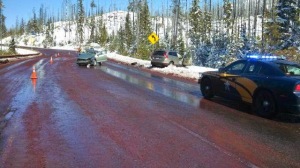Every winter, one of the questions I get from everyone is whether or not winter tires (also known as snow tires) are worth it. And every winter, I give the same answer: yes! I figured it was time to write an article explaining exactly why they’re worth it, and why you’d do well to pick them up before winter strikes again.
Why buy winter tires?
To put it simply, there are at least 5 reasons why winter tires are worth buying:
1. It’s not just the snow; it’s the temperature!
This is likely the single biggest mistake people make when justifying a bad decision to skip winter tires. Maybe you live in a part of the country where you don’t get snow every day, or where the snow you do get is just a few inches here or there that the plows typically clear out by afternoon. Or maybe you do get a lot of snow some winters, but this winter they’re predicting a light winter with not much snow, or you’ve just been lucky so far and are trying to save a few bucks.
All of these rationalizations are just that: rationalizations. Because you know what? All-season tires (commonly called no-season tires by safety afficionados) don’t just do a poor job with snow, they also do a poor job whenever it gets cold. Below around 45 degrees Fahrenheit, regular tires start behaving like used gum or play-doh that’s been left in an open container: rock hard. They lose their stick and lose their grip, which means they do poorly in the winter regardless of whether the road itself is bone dry or covered in snow, slush, ice, rain, or anything else. This means longer stopping distances, less traction, less maneuverability–you name it.
Winter tires are designed to be used in cold weather; they’re made from rubber that works best in the very temperatures where regular tires let you down.
2. All wheel drive is not enough. Nor is front wheel drive.
Another commonly-raised defense is that used by SUV drivers around the country: I have 4-Wheel Drive! I have All Wheel Drive! Similarly, car drivers gallantly proclaim: I have Front Wheel Drive!
Unfortunately, none of these drives are enough. All wheel drive can help you maneuver out of certain situations when you’re stuck and need to start moving, but it doesn’t do anything to help you with stopping or steering, which are usually where people go wrong right before a collision, whether that collision involves another car, a semi, a tree, or a guard rail.
Once again: all wheel drive helps you start. It does not help you stop.
What this means is that while marketers may make car commercials showing your Jeep / Ford / whatever powering up the North Mountain in post-Elsa Arendelle, it has pretty much nothing to do with reality. Let me tell you something: around half of the SUVs or pickups I research about in winter driving deaths are AWD or 4WD models. And whenever I’ve been unfortunate enough to drive past scores of vehicles littering the ditches after an ice storm or really bad snow storm, they’re almost always the big, bad SUVs with the 4WD Off Road Domination insignia everywhere.
Front wheel drivers, you’re no better off, unfortunately, for the same reason: whatever you’re using to drive you isn’t what’s going to stop you. Every vehicle already has four wheel braking and two wheel steering; what matters is what’s touching the road.
3. Traction control, ABS, and stability control are useless.
When I say traction control, anti-lock braking systems, and electronic stability control are useless, I don’t really mean useless in the sense that you should drive your vehicle with these features into the nearest landfill. They’re all great features, especially ABS and ESC, which together will likely save as many lives as seat belts in the coming years now that they’re finally standard on vehicles. But much as how your seat belt won’t save you if you’re driving into the path of an oncoming semi (the forces are just too great), ABS and ESC won’t make a meaningful difference if they don’t have tires that help them do their job.
Yes, ABS will brake your vehicle as much as possible regardless of how bad your tires are, and ESC will take things a step further and selectively brake your wheels in effort to keep you from spinning like an ice skater into that frozen lake on your right as you slide screaming off the road, but in order for them to help save your life, they need tires that give every advantage possible in the treacherous conditions of winter driving. I’ll take a car without ABS or ESC but with winter tires out into an ice storm any day over the same car with ABS and ESC but with bad tires. That’s how much of a difference they make.
4. You can’t always stay off the roads or simply drive slowly.
This is a point I used to use myself back when I was a Winter Tire Denier, so I’ve got a lot of empathy when I see other people use it. The argument is that if you drive slowly and carefully enough, then you don’t need winter tires. Or to take it to an even greater extreme, if you can simply stay off the roads, you won’t have to worry about this at all.
Both of these are true to an extent, but the very fact that both points are used as arguments suggests that you know deep down that you are taking a significantly greater risk by foregoing winter tires. I knew that back then too; I just didn’t want to admit it, so I kept telling myself that as long as I drove carefully, things would be okay.
For me, they were. But that’s not the case for everyone. In fact, that’s not the case for about half of the people who die in the US every year due to car collisions. Half of all fatalities are single-vehicle fatalities, which means no other vehicles hit these drivers before they died. The fact of the matter is that there are a number of road conditions out there that are simply beyond the skill of any driver. That’s why we have technology help us as much as possible. Winter tires are some of the finest technology invented for winter driving.
Yes, staying home is safer. But it’s not always possible. Emergencies pop up every day around the country, whether in the form of medical situations, family situations, food situations, or simply unforeseen circumstances. And if you’ve got a vehicle, it means you acknowledge that there are times when you’ll need to drive. So why not buy a set of winter tires and rims so you’ll have a very basic, but very meaningful advantage each winter?
5. An ounce of prevention is worth a pound of cure, or the life you save may be your own.
Finally, and most frankly, I’m going to state the obvious: there are certain mistakes in life you can’t take back. I’m an optimist, and believe that most mistakes are generally manageable, although the consequences may take an exceptionally long time to manage. But some things are different, and the most obvious example is death.
If you or your loved ones get into a crash that would have been preventable if your vehicle had been outfitted with winter tires, you’re not always going to be fortunate enough to be able to do things over. And unfortunately, there are hundreds of these kinds of deaths each winter–deaths that are directly attributable to people losing control of their vehicles due to using tires that were simply unsuitable for the road conditions.
One example that comes to mind involves Deana May Igoe, whom I wrote about last year. You’ve probably never heard of her, but she was a lady traveling across the country who lost control on a highway in Oregon in early spring 2014, and skidded sideways into the path of an oncoming SUV. She died at the scene. This sad scenario repeats itself over and over each year with drivers who either don’t know or don’t care about the benefits of winter tires. Don’t let your family members join the statistics. You can buy good winter tires for your vehicle from just about anywhere. I bought mine from Amazon to take advantage of the free returns and shipping, but it doesn’t matter where you go. Just get them, and tell everyone you know to get them too. Life is short enough.
—
If you find the information on car safety, recommended car seats, and car seat reviews on this car seat blog helpful, you can shop through this Amazon link for any purchases, car seat-related or not. Canadians can shop through this link for Canadian purchases.


